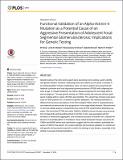| dc.contributor.author | Feng, Di | en_US |
| dc.contributor.author | Steinke, Julia M. | en_US |
| dc.contributor.author | Krishnan, Ramaswamy | en_US |
| dc.contributor.author | Birrane, Gabriel | en_US |
| dc.contributor.author | Pollak, Martin R. | en_US |
| dc.date.accessioned | 2017-01-03T23:48:07Z | |
| dc.date.issued | 2016 | en_US |
| dc.identifier.citation | Feng, Di, Julia M. Steinke, Ramaswamy Krishnan, Gabriel Birrane, and Martin R. Pollak. 2016. “Functional Validation of an Alpha-Actinin-4 Mutation as a Potential Cause of an Aggressive Presentation of Adolescent Focal Segmental Glomerulosclerosis: Implications for Genetic Testing.” PLoS ONE 11 (12): e0167467. doi:10.1371/journal.pone.0167467. http://dx.doi.org/10.1371/journal.pone.0167467. | en |
| dc.identifier.issn | 1932-6203 | en |
| dc.identifier.uri | http://nrs.harvard.edu/urn-3:HUL.InstRepos:29738922 | |
| dc.description.abstract | Genetic testing in the clinic and research lab is becoming more routinely used to identify rare genetic variants. However, attributing these rare variants as the cause of disease in an individual patient remains challenging. Here, we report a patient who presented with nephrotic syndrome and focal segmental glomerulosclerosis (FSGS) with collapsing features at age 14. Despite treatment, her kidney disease progressed to end-stage within a year of diagnosis. Through genetic testing, an Y265H variant with unknown clinical significance in alpha-actinin-4 gene (ACTN4) was identified. This variant has not been seen previously in FSGS patients nor is it present in genetic databases. Her clinical presentation is different from previous descriptions of ACTN4 mediated FSGS, which is characterized by sub-nephrotic proteinuria and slow progression to end stage kidney disease. We performed in vitro and cellular assays to characterize this novel ACTN4 variant before attributing causation. We found that ACTN4 with either Y265H or K255E (a known disease-causing mutation) increased the actin bundling activity of ACTN4 in vitro, was associated with the formation of intracellular aggregates, and increased podocyte contractile force. Despite the absence of a familial pattern of inheritance, these similar biological changes caused by the Y265H and K255E amino acid substitutions suggest that this new variant is potentially the cause of FSGS in this patient. Our studies highlight that functional validation in complement with genetic testing may be required to confirm the etiology of rare disease, especially in the setting of unusual clinical presentations. | en |
| dc.language.iso | en_US | en |
| dc.publisher | Public Library of Science | en |
| dc.relation.isversionof | doi:10.1371/journal.pone.0167467 | en |
| dc.relation.hasversion | http://www.ncbi.nlm.nih.gov/pmc/articles/PMC5158186/pdf/ | en |
| dash.license | LAA | en_US |
| dc.subject | Biology and Life Sciences | en |
| dc.subject | Anatomy | en |
| dc.subject | Renal System | en |
| dc.subject | Kidneys | en |
| dc.subject | Medicine and Health Sciences | en |
| dc.subject | Clinical Genetics | en |
| dc.subject | Genetic Testing | en |
| dc.subject | Genetics | en |
| dc.subject | Genomics | en |
| dc.subject | Genomic Medicine | en |
| dc.subject | Human Genetics | en |
| dc.subject | Nephrology | en |
| dc.subject | Chronic Kidney Disease | en |
| dc.subject | Biochemistry | en |
| dc.subject | Proteins | en |
| dc.subject | Contractile Proteins | en |
| dc.subject | Actins | en |
| dc.subject | Cytoskeletal Proteins | en |
| dc.subject | Genetics of Disease | en |
| dc.subject | Mutation | en |
| dc.subject | Substitution Mutation | en |
| dc.subject | Cell Biology | en |
| dc.subject | Cellular Structures and Organelles | en |
| dc.subject | Cytoskeleton | en |
| dc.title | Functional Validation of an Alpha-Actinin-4 Mutation as a Potential Cause of an Aggressive Presentation of Adolescent Focal Segmental Glomerulosclerosis: Implications for Genetic Testing | en |
| dc.type | Journal Article | en_US |
| dc.description.version | Version of Record | en |
| dc.relation.journal | PLoS ONE | en |
| dash.depositing.author | Feng, Di | en_US |
| dc.date.available | 2017-01-03T23:48:07Z | |
| dc.identifier.doi | 10.1371/journal.pone.0167467 | * |
| dash.contributor.affiliated | Feng, Di | |
| dash.contributor.affiliated | Krishnan, Ramaswamy | |
| dash.contributor.affiliated | Birrane, Gabriel | |
| dash.contributor.affiliated | Pollak, Martin | |


